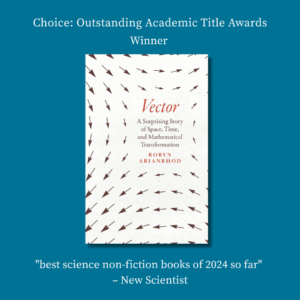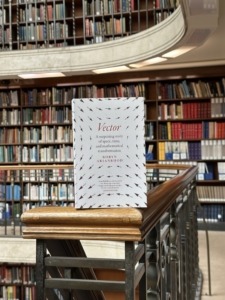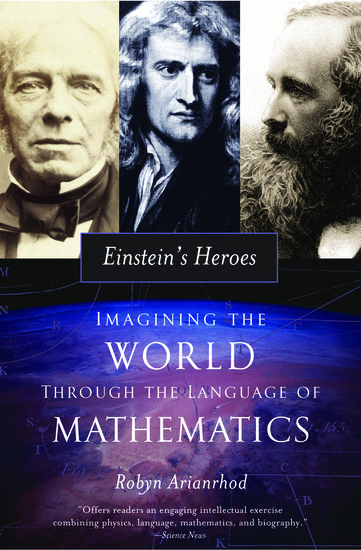Latest News
I really enjoyed my recent conversation with Jacob Beckey and Brian Wargo, from the Idealised Science Institute.
This is from their website (with the link to the conversation below):
In this episode of the Idealized Science podcast, hosts Jacob Beckey and Dr. Brian Wargo engage with Robyn Arianrhod, a science writer with a PhD in mathematics. They discuss her journey into science writing, the influence of nature on scientific understanding, and the importance of historical context in mathematics. The conversation highlights the beauty and challenges of mathematics, the role of collaboration in scientific discovery, and the evolution of mathematical notation. Arianrhod emphasizes the need for inspiring students through stories of science and the impact of popular science writing in education. The episode concludes with practical advice for teachers on incorporating engaging narratives into their lessons
https://rss.com/podcasts/idealized-science/2424412/
Today, October 16, is Hamilton Day – the day maths buffs celebrate the most famous mathematical graffiti in history. Here is the link to an article explaining the significance of Hamilton’s graffiti, which I published for last year’s Hamilton Day. Hope you enjoy it!
https://theconversation.com/three-letters-one-number-a-knife-and-a-stone-bridge-how-a-graffitied-equation-changed-mathematical-history-241034
I’ve been meaning to share this nice recognition of Vector from earlier this year, as a Choice (US Libraries) Outstanding Academic Title. The image is from the University of Chicago Press’s Instagram:

I’m thrilled and humbled to share that my book Vector (University of Chicago Press/UNSW Press) won the 2025 General History Prize in the NSW History Awards on Friday night (5 September). Heartfelt thanks to all who made this possible, and to the NSW State Library for such a wonderful ceremony.
And many thanks to Harriet McInerney, who published Vector at NSW Press, and who took this photo of me feeling overwhelmed as I accepted the award! (On the screen behind me, a miracle of maths-enabled technology was turning my words into print as I spoke!)
Grateful thanks to the judges, especially the Senior Judge, Professor Matthew Fitzpatrick (at left), and to the Hon John Graham, NSW Minister for the Arts (in the centre).

I’m delighted to share that Vector has been shortlisted for the NSW General History Award. Grateful thanks to the judges for recognising that mathematics, far from being dry or boring, can underpin good historical storytelling. You can see their report here:
https://www.sl.nsw.gov.au/awards/general-history-prize/2025-shortlisted-vector-surprising-story-space-time-and-mathematical

@statelibrarynsw, #NSWHA
This week’s Science Show (26 July 2025) has a section celebrating the centenary of quantum mechanics, which underpins so much of today’s microtechnology. I was one of the interviewees in the show, and it was great to talk about some of the amazing things that grew out of the discoveries made in 1925. Here is the link to an article based on the show (and there’s a link to the audio at the bottom of the article):
https://www.abc.net.au/news/science/2025-07-29/quantum-mechanics-100-years-physics-heisenberg-schroedinger/105425950
On 24 May, Radio National’s Science Show was devoted to the amazing nineteenth century mathematician Mary Somerville. I was delighted to be one of the guests talking about Mary’s life and work (which was the subject of my book Seduced by Logic) – and you can listen to the program here:
https://www.abc.net.au/listen/programs/scienceshow/mary-somerville/105251710
Today, March 14, is Pi Day, and the International Day of Mathematics (IDM). It’s also Einstein’s birthday. To celebrate, I’m posting here an article about pi that I wrote for Cosmos magazine a few years ago. The IDM theme is different this year, but the link embedded in the article takes you to this year’s website. Happy IDM and Pi Day!
I’d like to share another review of Vector (and to offer my thanks to the reviewer); it’s from Choice Connect:
My thanks to Robyn Arianrhod (Monash Univ.) for producing perhaps the best historical text about a topic in mathematics. Arianrhod is a great storyteller who gently leads the reader through important yet deep mathematical content via her provision of context—historical and mathematical—while also revealing personal motivations, problems-to-be-solved, disappointments, intellectual disputes, and primacy arguments. Though the book’s goal is to tell the story of vectors and tensors, the story is necessarily woven within the histories of algebra, calculus, imaginary numbers, quaternions, matrices, non-Euclidian geometry, differential geometry, physics, electromagnetism, and the Theory of Relativity.
In turn, Arianrhod cleverly introduces a wide range of mathematicians, with a focus on their commitment to creativity and human imagination as they helped advance and use the concepts of vectors and tensors. To further help and educate the reader, Arianrhod provides an extensive timeline, extensive notes for each chapter, and a comprehensive index.
Readers are encouraged to give the book a try. Let Arianrhod tell her story and expect to be captivated, as it is a demanding book that is difficult to put down before the story is finished…
–J. Johnson, emeritus, Western Washington University
Vector has continued to attract positive reviews, including this one in Australian Book Review. My thanks to the reviewers, and especially to the readers who have written to me – very much appreciated!
Speaking of reviews, you can see my take on literary criticism – its importance, and the difference between good and bad reviewing – here: it was published in Australian Book Review in September.
In addition, Vector was selected by New Scientist as one of the best books of 2024. It also featured in this lovely Guardian editorial, about the beauty of numbers and new ways of seeing the world.
I’m delighted to share something of a new review of my latest book:
“Vector is written in an engaging style with attention to the human side of the story and is intended for a broad audience.” I’m so pleased that the reviewer highlighted this, because this is what I’d hoped I was doing! After exploring the book’s contents, he summed up by saying,
“Vector succeeds on several levels, as a stimulating survey of the development of the subject over the centuries, as a reference source for historical work that has been done, and as an accessible exposition of interesting but technical subject matter. In the history of physics and mathematics today the mathematical content is often viewed as something like a black box, with the primary focus being on the professional milieu or biographical and institutional details. It is commendable in a book for a wider audience that so much attention is devoted to looking at the mathematics itself and making it understandable.” — Annals of Science, Craig Fraser, University of Toronto.
Thank-you, Dr Fraser, for taking the time to read and review the book in such detail.
In the August 2024 issue of Australian Book Review magazine (podcast at https://www.australianbookreview.com.au/podcast), I have an essay on why our literary gatekeepers should pay more attention to literary science writing. I also note the demise of such writing in many science magazines, which now tend to favour personalized journalism to the exclusion of narrative exposition. I think this is a backward step for promoting understanding of science – we need both types of writing, journalism and exposition – but I welcome your feedback!
My thanks to Ben Marshall for his lovely review of my new book, Vector:
https://tasmaniantimes.com/2024/07/review-vector-by-robyn-arianrhod/#google_vignette
Last week’s Science Show had a great segment on Einstein, his general theory of relativity, and where to next. Speakers included Carlo Rovelli, Susan Scott, and others – including me! You can hear it here:
https://www.abc.net.au/listen/programs/scienceshow/physics-relativity-quantum-gravity/103903212
My new book Vector received a nice mention in Mathematics Magazine last week. It begins: “This remarkable book relates the history of vectors and tensors, including relevant biographical information about the main progenitors of the concepts….”
As the reviewer goes on to say, the book increases in complexity: the first third is an “easy read;” the middle section is about the role in the story of vectors that Maxwell and his equations of electromagnetism (the equations that led to the discovery of radio waves, and ultimately to our wireless tech); and the final third is more demanding, venturing into curved spaces, spacetime, and the maths of tensors, which Einstein made famous in his general theory of relativity. I wanted to offer plenty of “brain candy” in this book, but I always write in the hope that readers who want less mathematics at any point can skip over the detail and still enjoy the story 🙂
I’m excited to announce that my new book, Vector: A surprising story of space, time, and mathematical transformation, will be published at the end of May 2024 by University of Chicago Press (https://press.uchicago.edu/ucp/books/book/chicago/V/bo213793784.html), and the Australian edition will be published by NewSouth on July 1 (https://unsw.press/books/vector/).
I’m also thrilled that two translations are already underway!
‘In Vector, Arianrhod shows, with beautiful ease, that maths is not some foreign world only geeks inhabit. It is the world around us.’ ― Adam Spencer, author of Adam Spencer’s Big Book of Numbers
THE ART OF LOGICAL THINKING is the title of my recent Cosmos feature: “There’s a line of logic stretching from Aristotle to artificial intelligence, writes Robyn Arianrhod, and standing near its crest is the witty and brilliant Briton Bertrand Russell.” In the article I outline the link between thought, logic, mathematics, and computing. In the process, I show how Russell – the inimitable philosopher, mathematician, and Nobel-Prize-winning writer – logically proved that he was the pope! (Spoiler alert: a sentence can be logically true even if its premises are false!) The article also celebrates Russell’s 150th birthday, and you can access it online if you are a Cosmos subscriber.
 Untapped signifies the Australian Literary Heritage Project, which digitises culturally significant out-of-print Australian books. I was dismayed when UQP let my Einstein’s Heroes go out of print in Australia, so I’m delighted that Untapped has rescued it digitally, and Brio Books has published a new print edition, available here.
Untapped signifies the Australian Literary Heritage Project, which digitises culturally significant out-of-print Australian books. I was dismayed when UQP let my Einstein’s Heroes go out of print in Australia, so I’m delighted that Untapped has rescued it digitally, and Brio Books has published a new print edition, available here.
